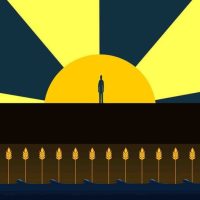The reader of this essay may wonder about the title of this piece. To make matters clear, the title is not a reference to Byelorussians, anti-communist Russian Civil War partisans, or Russians of European extraction. In fact, the title is a reference to Norman Mailer’s seminal essay from 1957 – “The White Negro: Superficial Reflections on the Hipster.” Now, I don’t recommend that any of you read the essay mentioned, since it truly is fairly shallow, but I felt this would be a good point of departure for my own metaphysical sketch of American life at the present.
In his essay, Mailer draws a picture of American life where the omnipresent threat of thermonuclear war, combined with the prevailing conformity of post-war America, has created a stultifying, materialistic, and neurotic society where a growing number of people find it impossible to “fit in” or create genuine meaning in their lives. As a result of these tensions, a large underground had developed around those aspects of American society that couldn’t be integrated into the mainstream of Eisenhower-era America, namely the African-American community and its adjacent bohemian subcultures. With black jazz and blues serving as a unifying force for this “shadow” of ‘50s America, a purpose which rock ‘n’ roll would fulfill for later generations, a smoldering underground was forged where America’s outcasts could find refuge from the shallow materialism of their peers. According to Mailer, it was only natural for most “American existentialists” to seek refuge in this culture, to learn what he could from the Negro and even grow to be more like him, to identify with him and his chaotic free-spirited way of life, ever in search of his next high. In a world where all life on Earth could be wiped out in an instant, one could be more like the Negro and live for today.
Regardless of what you may think of the counter-culture of the ‘50s and its later permutations, you cannot deny that Mailer touched upon a palpable aspect of his Zeitgeist. No matter your political alignment, and the counter-culture in the United States certainly did have roots in the Nietzschean counter-cultures of 19th century and early 20th century Europe, you were bound to absorb some of the “synapses” of the African-American if you were at all sensitive to social dynamics and inclined towards rebellion.
Without delving too deeply into the subject of the post-war counter-culture, I think one can safely say that what may have started as authentic rebellion eventually culminated in the “New Establishment” of the 1970s. With the ascendance of this new and more diverse establishment, which, in all honesty, came to power by hijacking the existential angst of the American hippies and beatniks, the inherent rebelliousness of the American youth culture, and its attached bohemian milieus, continued to fade, until it was, by the 2000s, nothing but a mere shadow of its former self. By the mid-2000s, when neoliberalism seemed most firmly entrenched, it appeared there was no counter-culture at all to speak of; instead, what existed was performative posturing of the lowest sort. Even the Republican Party had come to embrace many of the policies of the Left and the “New Establishment” – so, it seemed, the sun had set on the timeless American rebel.
Needless to say, as history will always have it, neoliberalism was not the end of humanity’s political development, but instead a major hiccup in world-historical evolution. This all became clearly evident with the stock market crash of 2007 – 2008 and the subsequent economic depression, brought about by wanton deregulation of the finance sector, allowing for the abuse of derivatives markets on a massive scale. With this collapse of the Western economies, the fate of this new order was sealed, though they assumed otherwise.
While, to some, it may have seemed that the election of Barack Obama in 2008 represented the apotheosis of the New Left in the United States, it was in fact its death knell. With the advent of the Obama administration, the Left continued its assimilation of marginalized groups, and especially American blacks, until they were almost totally integrated into the mainstream power structure of the Democratic Party, and thus the American establishment. With this shift, they had lost their genuine revolutionary fervor, and their cultural cachet soon followed. When the will to separate and forge their own destiny had disappeared, as advocated by Malcolm X and Marcus Garvey, so too did their unique sparkle within the American underworld. The American existentialist, therefore, was once again adrift in his lonely sea of despair, or so it seemed!
Little did the average regime apparatchik know, there was a new revolutionary spirit germinating in the shadows of bourgeois America. Unlike previous manifestations of post-war unrest, this would prove a far greater threat to the American establishment. Deep within certain hidden forums and academies, blogs, and on certain imageboards such as 4chan, a new mode of expression was manifesting. However, this time, it was not the black who was giving expression to his discontent, but the White youths, mostly Millennials, who had been marginalized by left-liberal policies since the end of the Cold War. No longer able to find true meaning in a world where their once proud nations had been rendered multicultural hellholes, mere economic zones as opposed to living, breathing cultures, they turned to the seemingly forgotten ideas of Spengler, Nietzsche, and the other philosophers of Germanic pessimism.
From this milieu grew many ideas and personalities, many of which I’m sure the reader is aware and so I’ll go without mentioning them. Still, for many years, this smoldering movement lay dormant, lying in wait for its opportunity, which it found, finally, in 2016. The 2016 election cycle, in my view, represented a genuinely revolutionary moment in American history. Despite what you may think of Donald Trump, it allowed for grievances to be voiced which had to that point been suppressed. With the emergence, then, of long forgotten nationalist ideas on social media, with the eruption of this new, virtual underworld, the American existentialist once again found his ground, this time among the primarily European-American dissidents of the West. In this world, he could thrive, in opposition to the powers that be and the prison they had wrought.
All through this transformation of the White American outcast, we can notice a significant trend, which will be the main focus of this essay – that is the trend to admire or sympathize with Putin’s Russian Federation. This is all very understandable considering the similarities between the United States and Russia and Putin’s achievements. The parallels are marked and certainly well known to the reader; both Cold War superpowers, they suffered from similar fates after the collapse of the USSR, resulting in increasing inequality, a decreased quality of life, and both cultural and technological stagnation.
With this shift in American governance, which could be characterized as the overextension of certain neoliberal policies for short term economic gains, America saw a marked decline in prestige, cohesion, and vitality, exposing the inherent weakness of the post-war order. However, while Russia under Putin turned away from liberalism and towards a managed democracy infused with Orthodox Christianity, the United States decided to accelerate itself towards what they believed was a left-liberal utopia, as foreseen by John Rawls and the like. Needless to say, America’s foolhardy optimism, no doubt bolstered by its so-called “victory” in the Cold War, was ultimately its undoing. No sensible man would dare to say, in the current year, that the United States has managed to preserve its traditional way of life, while they could conceivably say that about Russia.
A natural product of this, coupled perhaps with increased Slavic immigration and greater cultural osmosis in a broader sense, has been the Russification of the American outcast. Indeed, as America progressively became more authoritarian in its assertion of left-liberalism, which is essentially just a dialectical synthesis of Marxism and classical liberalism, the American dissident has had to become vastly MORE Russian in his temperament. Under the constant watch of the state’s secret police, with regime apparatchiks in every major corporation and government office, where one unflinchingly must toe the line of the new “woke” ideology, or else risk becoming unpersoned, the American dissident has had to learn to keep his opinions to himself, which is something very un-American in a way, as the First Amendment was always held to be sacred. With this turn, the dissident has then learned to embrace stoicism, samizdat, dark humor, irony, and all of the once unnecessary tools of those other dissidents in Eastern Europe. All of the freedoms once taken for granted are now under threat, and the free discourse of the world’s most powerful republic has become strained; with this, the American man, that pinnacle of modernity who once towered over the world like the Olympians of old, has been revealed as a mere mortal.
Though, as fate would have it, the American is not so easily tossed aside, and what has emerged in response to these pressures is a profound underground ecosystem that has surpassed any of its counterparts elsewhere. Within this parallel ecosystem of broadcasts, humor, and samizdat, the American dissident, now likely to be a right-winger of either a futurist or traditionalist persuasion, temporarily in exile from his spiritual home in the center of American society, has been able to find his bearings and regroup for what may be the final struggle that determines the fate of European civilization. As a result of his incredible and heartbreaking alienation, the Western man has once again found the silence necessary to connect with his soul. In this silence, he has grown more philosophical, more spiritual, while the old art and music speaks to him once more. In this sense, he grows ever more like his counterparts in Russia, and less like the remnants of the woke, consumerist mainstream.
As one might expect, the recent war in the Ukraine has brought these cultural developments into focus. In the United States we now see a large contingent of conservatives and their fellow travelers, including some sitting members of the House and Senate, oppose America’s aid to the Ukraine. To touch upon the absurd economics of American foreign aid would take another essay, but this tendency, for the American Right, unimpeded by the recent anti-Russian hysteria on the part of the Democrats, to now identify with Putin’s regime in Russia seems to be set in stone. That’s not to say that Putin’s regime is perfect, because it certainly isn’t – Putin’s Russia has myriad problems of its own – but it’s certainly superior to the downright traitorous and nefarious regimes of the West.
To touch upon some of the more speculative aspects of this trend, I’d like to refer to the theories of Oswald Spengler. According to Spengler, cultures have a lifecycle, evolving from the early “cultural stage” of development, which is the stage of maximum potential and vitality, to the civilizational stage, which is a calcification of the cultural form. However, one underdiscussed aspect of Spengler’s theory is the concept of “pseudomorphosis.” According to Spengler, before a proper culture materializes, it can experience pseudomorphosis. Pseudomorphosis, which is the process of transformation into a pseudomorph, literally meaning “false form,” is a term taken from mineralogy, referring to how certain minerals supplant other minerals and take on their shape. Spengler uses this term to refer to very young cultures, or proto-cultures, that are heavily influenced by older, civilizational culture forms. Russia, according to Spengler, falls into this category; while it is heavily influenced by the Western (Faustian) culture, it is in fact its own culture yearning for expression. Indeed, it is theorized to represent the dawning of the Slavic culture form, based around the prime symbol of the “infinite plane.” So, though a pseudomorphic proto-culture may lack coherence, it is actually a state of immense potential and vitality; it is thus reasonable to assume that Russia, with this immense will-to-power, has the ability to reinvigorate aspects of the Western civilization that have been rendered dormant.
To conclude this piece, I’d like to implore the reader to consider the many changes that have taken place in the West since the 1990s, especially in the United States, and the subsequent ramifications of these tectonic shifts. So, is it true that the American man has become more secretive, calculating, and perhaps mystical in his outlook? Does the situation in the United States not represent circumstances similar to the final days of the Soviet Union? Do we not, as Western men, now have the opportunity to make a difference on a world-historical scale, to put our foot down once and for all? These questions, and others, I leave to the reader. But, at this time, I think that one thing is fairly certain; we are without a doubt seeing the dawn of a new man in America.
-By Varūtha

Visit The American Sun at The American Sun






This is an excellent of an article that’s very accurate from the view from above, but very misleading in terms of the specific facts cites and then amplified by hyperbole that build up to the greater-truth of the macro-view.
Anyhow, to comment on a few things:
> “you were bound to absorb some of the “synapses” of the African-American if you were at all sensitive to social dynamics and inclined towards rebellion.”
This is especially true today, even amongst Gen-Z conservatives (zoomercons?) and the Groypers.
> “Still, for many years, this smoldering movement lay dormant, lying in wait for its opportunity, which it found, finally, in 2016.”
IMO a large part of the alt-right’s (wow, hard to believe its close to a decade ago) influence was due to the liberal media constantly laying in wait for “Nazis” or “the KKK” to appear. This is to say, the AR was influential mostly because the left media chose to make it influential. The number of actual people in the “movement” was *very* small.
> “…to admire or sympathize with Putin’s Russian Federation. This is all very understandable considering the similarities between the United States and Russia and Putin’s achievements. The parallels are marked and certainly well known to the reader; both Cold War superpowers, they suffered from similar fates after the collapse of the USSR, resulting in increasing inequality, a decreased quality of life, and both cultural and technological stagnation.”
Uhhhh… there are basically no parallels, at all, between America and Russia. Those who think there are tend to be extremely-online slavaboos.
Also, even the economic segment is so hyperbole its almost nonsensical. You can’t compare the economic effects on the average Russian in 1991 with the average White American in 2022. Yes, a lot of the modern US economy (“muh GDP”) is de-facto fake and comprised of useless services or nibbatech (smartphones, videogames, video streaming, most consumer-level “gadgets”, etc), but even with as bad as things are now, there’s no comparison to Russia in the early 90s.
Even religiously, most devout in the USA are Evangelical and that’s like a 180 degree difference of understanding the Russian Orthodox person has of God. There are basically different religions that share the same name.
> “…Under the constant watch of the state’s secret police, with regime apparatchiks in every major corporation and government office, where one unflinchingly must toe the line of the new “woke” ideology, or else risk becoming unpersoned, the American dissident has had to learn to keep his opinions to himself…”
Much of this is hyperbole. The average blue collar male doesn’t see much of this in his daily life
> “In the United States we now see a large contingent of conservatives and their fellow travelers, including some sitting members of the House and Senate, oppose America’s aid to the Ukraine.”
Not wanting to throw countless billions down the infinite moneyhole of the Ukraine is not-at-all the same thing as liking / supporting Russia.
> “…Russia, according to Spengler, falls into this category; while it is heavily influenced by the Western (Faustian) culture, it is in fact its own culture yearning for expression. Indeed, it is theorized to represent the dawning of the Slavic culture form, based around the prime symbol of the “infinite plane.” So, though a pseudomorphic proto-culture may lack coherence…”
Wow, I have not seen this level of autism since the RadTrad(TM) days of alt-right discussion groups and various articles posted to blogs.
None of this is to say the OP article was bad or ineffective. In fact, it was quite motivating to read and I personally enjoyed it. I’m only putting this out there so that certain extremely-online types can get a check to the typical online web comments section version of reality